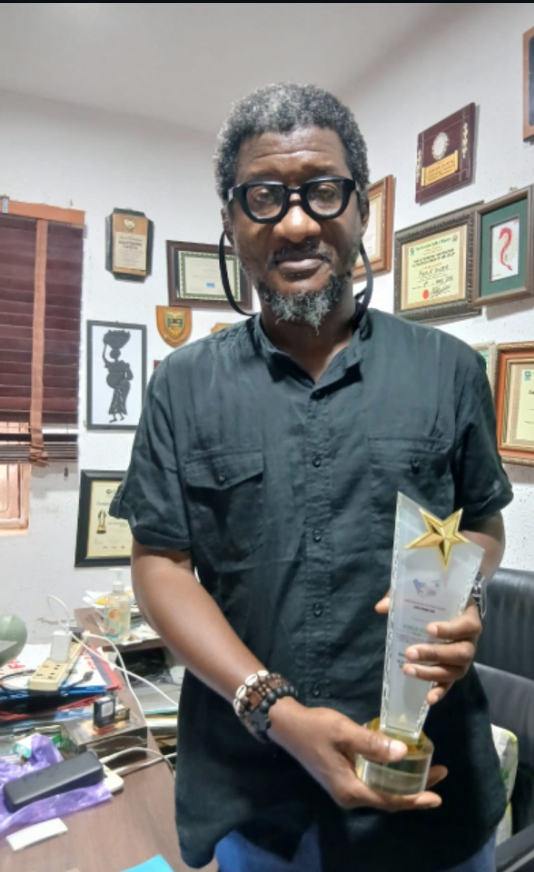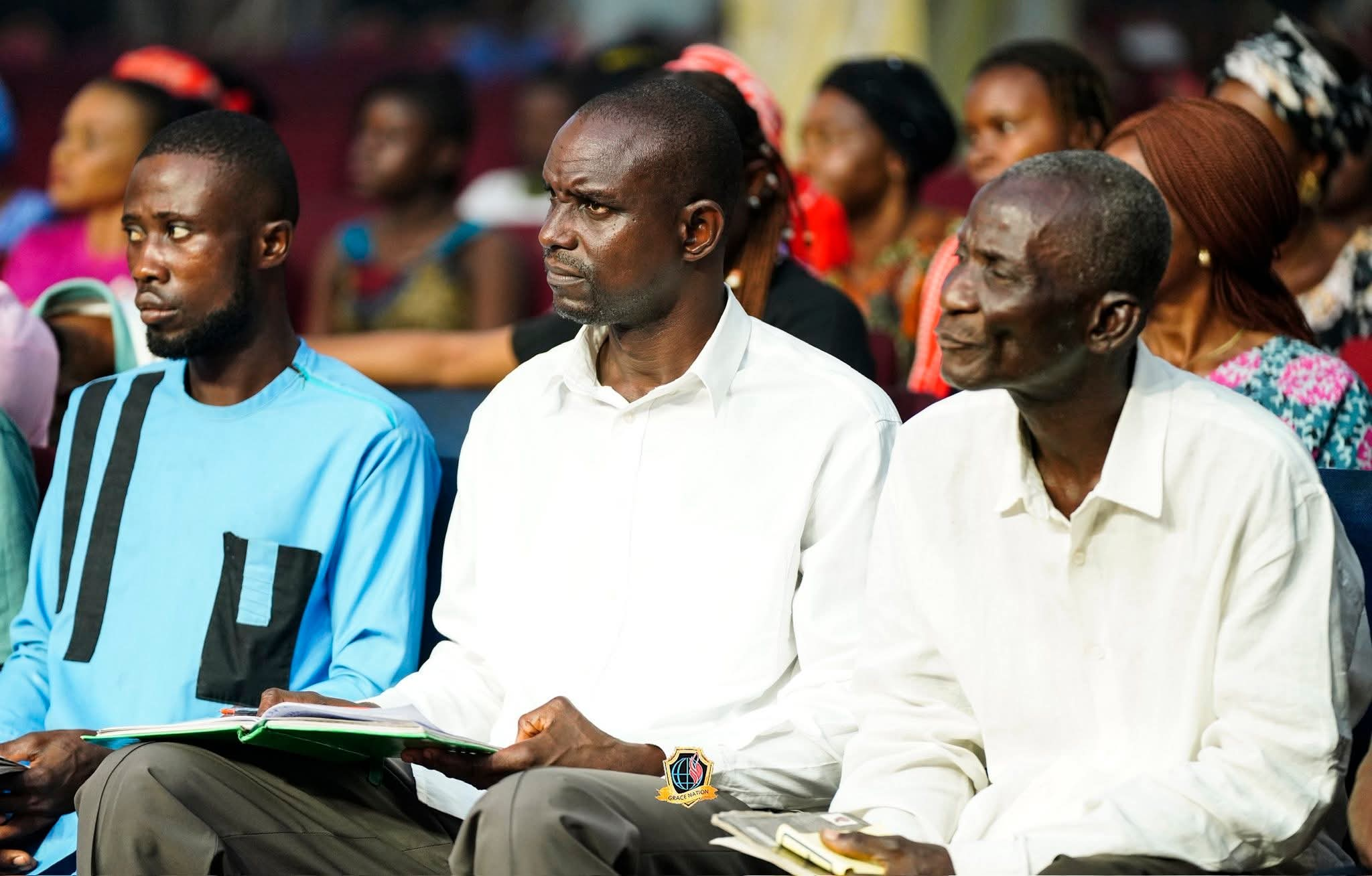celebrity radar - gossips
How Oluwo Of Iwo Was Jailed In The US By Tunde Odesola

Nestling aboard an incoming Delta Airline flight from Atlanta, Georgia on May 10, 2024, the window-seat view of the landscape and skyscape of Ikeja cityscape was gloomy. The giant American bird called Boeing glided through the clouds before swooping down intently like a hawk in hunt. There were no trees, no greenery in sight from my Skyview as Lagos spread out like a ghetto cast in concrete, iron, rubble and filth.
“Where are all the trees the Babatunde Fashola administration planted,” I asked myself. I answered myself, “Felled by the Godfather and his mafia who were happy to throw the baby out with the bathwater.” Like the Champions League is to Real Madrid, Lagos has become a political trophy belonging to the MD – Master Dribbler – who has dribbled his way to the Centre, and Nigeria now lies unconsciously at his feet.
The plane touched down around 10 a.m. Welcome to Nigeria! After about eight years, it felt good to be back home. A national anthem war would soon rage between ‘nationalists’ and ‘colonialists’, amid chants of ‘Arise, O Compatriots’ and shouts of ‘Nigeria, we hail thee’. The national anthem war was avoidable if leadership had a meaning in Nigeria. But leisurely, Captain Bourdillon draws hard on his cigar, steering the wheel of the sinking Nigerian ship back into slavery waters. The controversial descriptions of Nigeria as Fatherland and Motherland in the two national anthems show that Nigeria urgently needs a DNA test to confirm its legitimacy.
As passengers disgorged from the belly of the bird, I caught a whiff of the perennial Nigerian virus when a dirty-looking lady in mufti, whose wrinkled skin betrays bleaching cream overuse, held a ‘gentleman’ in suit by the hand, and led him from the back of the queue towards the front. Ironically, the queue was fast-moving.
I raised my voice in protest. “Una no even allow the plane land before una begin una madness! You, yeye man, you fit jump queue for US? You, (pointing at the ‘immigration’ woman), take that man back to the end of the queue from where you took him!”
I heard the yeye man tell the clutchy lady, ‘I told you it’s wrong, I don’t like causing a scene’ but the woman held his hand and led him on, all the same, prompting me to raise my voice louder, cussing and embarrassing them both.
An old man at my back in the queue said, “Young man, when last did you come to Nigeria?” I told him I didn’t understand his question. He continued, “Nigeria is not America. That’s the way we are here o.” I told him, “Every society needs eternal vigilance to oil the wheels of justice and fairness.” He shrugged, “Well, I agree.”
In no time, I was done with immigration and I landed at the carousel for my luggage. My luggage didn’t arrive on the plane: come tomorrow. Ok. No wahala. Tomorrow is a stone’s throw.
I hopped into a taxi. Portable omo Olalomi hopped in with me. The car stereo blared: “Ara adugbo (Zeh) /Tuntun ti de o (Zeh) /Zazoo (Zeh) /O po leti (Zeh) /O ye ke ti ma gbo (Zeh)… /Baddo sneh (Zeh) /Pepper sneh (Zeh) /Many many were wa n le (Zeh) /Ahh, repete (Zeh) /Unruly (Zeh) /Baddo Lee (Zeh) /Hacker (Zeh) /Ika (Zeh) /Te s’oju e (Zeh)… /Eje loju bi t’Abacha (Zeh) /Run’ju pa (Zeh) /Le’ju pa (Zeh) /Ma rerin (Zeh) /Kala (Zeh) /Daju (Zeh) /Hu wa ika (Zeh)… If you don’t understand these Yoruba lyrics, just imagine Adolf Hiler, ogres, members of Nigeria’s political class, together with Satan and his angels in a dark hall – you’ll understand the level of mercilessness Portable portrays in Zazoo.
‘Zazoo’ is the story of Nigeria’s degeneration. Though it has a multiplicity of meanings, a central theme of the song includes the glorification of internet fraud expressed in ‘Hacker’, ‘Kolu to n bo kaadi o’. It also praises extreme wickedness in the referenced stanza. Most of the song is street nonsense.
I smiled wryly. The taxi driver didn’t know why. He asked, “You too like Portable, sir?” I kept the plastic smile on and fetched my phone from my pocket. WhatsApp was my first port of call. I scrolled. A senior colleague had sent me news links. They were about the Oluwo of Iwo, Oba Abdulrasheed Adewale Akanbi.
The senior colleague wrote, “See what you caused.” I skimmed through the texts and thought he was talking about the Oluwo’s aso òkè, which was similar to the one I wore during my father’s burial on Friday, May 17, 2024, in Lagos. I replied, “I’m not royal, I’m a hunter,” asking if he was talking about the aso òkè. My relentless senior highlighted to me the links to a story on the Oluwo done by two British tabloids, The Sun, and The Mail on Sunday.
Both British newspapers called the Oluwo a thief, a misfit, 419 king, Yahoo kingpin, ‘Kolu to n bo kaadi’ and jailbird.
Metaphorically, the reports of the newspapers intone that lacking royalty, honesty, loyalty, pedigree and bíbí ire – a Yoruba word for honour – the life of Abdulrasheed Adewale Akanbi and his emergence as the Oluwo of Iwo was a plot in the drama of the absurd, where a felon grabbed a crown to desecrate a town.
Specifically, on its May 19, 2024 cover, The Mail on Sunday splashed the picture of Akanbi in a close-up handshake with the Duke of Sussex, Prince Harry. The handshake, however, went beyond the elbow when the newspaper befouled the picture with the headline, “Royal Exclusive: Harry and conman Nigerian king twice deported from US.”
The description of the Oluwo as a criminal is the view and product of investigation of the British media, not mine. In a three-part series, ‘Oluwo and the glorification of ignorance’, Tunde the son of Odesola, expressed his views about Oluwo Akanbi in 2022 when he described the conman as a con-king transmuting into a king-kong.
In its publication on May 19, 2024, THE SUN was extensively brutal. The headline of the paper’s story reads, “Dodgy Royal: Nigerian King who Harry called his ‘in-law’ is ‘CONMAN jailed and deported after trying to cash stolen £247k cheque’, with the rider, ‘The ‘Funky King’ (Oluwo) was jailed 15 months in 1998”.
Reporting the three-day visit of the 39-year-old Harry and his 42-year-old wife, Meghan, to Nigeria, THE SUN reveals Akanbi had been deported twice from the US and banned twice for life from entering the US.
THE SUN story reads, “But the Nigerian royal (Oluwo) is a convicted fraudster who was twice kicked out of America. He was allegedly first arrested in Boston in 1998 after he tried to cash a stolen cheque for £247,000 from aviation company Boeing.
“Akanbi posed as a successful businessman called Joseph Pigott but cops were alerted by a suspicious bank teller at BankBoston. The conman (Oluwo) was also charged for forging a cheque for £59,000 using the name Thomas Eyring. He was also reportedly jailed for 15 months and deported to Nigeria in April 1999.
“His £1,500 fine was waived ‘because of an inability to pay’. Despite being banned from re-entering the US, he was then said to have been caught attempting to cross the border in March 2011. Akanbi was with his then-wife Rakiya Saidu and young son and claimed they were going to New York to shop.
“Facing the prospect of a maximum prison sentence of 20 years and a £197,000 fine, Akanbi pleaded guilty. He was sentenced to time served, deported and banned from the US for life a second time.”
If Akanbi had been jailed for 20 years, Iwo would never have witnessed these years of the locust nor would this big calabash of shame hang on the community’s neck. Iwo would’ve remained famous for the honour earned by former Oluwos, including Oba Parin, Oba Lamuye, Oba Samuel Abimbola, and Oba Olatunbosun Tadase among others. The sacred name of Iwo wouldn’t have been stained with dishonour.
If you’re close to Iwo, you could’ve heard their sons and daughters eulogise the impregnable security of the land, saying “Iwo ti o ni ilekun, ti o ni kokoro; eru wewe ni iran baba won fi n de ile.”
O ye descendants of Iwo, is it a mistake that your forebears left the city gateless and keyless? O ye children of Iwo, is it not too late now that a virus has crept onto the throne? Where were the ‘eru wewe’ small slaves sentineled at the gate when Akanbi crept into town? Sé wón gbà’bòdè ni? Did they sabotage?
Then-Governor of Ondo State, Dr Olusegun Mimiko, stood up for integrity when he kicked out the Deji of Akure, Oba Oluwadare Adepoju, from the palace in 2010, for beating his wife, Olori Bolanle.
From Ife to Oyo, Lagos, Ijebu, Abeokuta, Ede, Owo, Benin, Warri, Sokoto, Kano, Bauchi, Gwandu etc, monarchs had been dethroned. Sadly, none of the deposed kings in Nigeria’s history parades the kind of criminal credentials as the Oluwo. Governor Adeleke, ICPC, EFCC, National Council of Traditional Rulers, Yoruba Council of Obas, Iwo kingmakers, Iwo people, over to you. Oluwo must go!
celebrity radar - gossips
Another Feather for Nollywood Icon Fidelis Duker

**Another Feather for Nollywood Icon Fidelis Duker
*Lagos, Nigeria* — In a remarkable celebration of artistic achievement, renowned Nollywood figure Fidelis Duker received yet another prestigious accolade last weekend, solidifying his role as a key player in the growth of the Nigerian and African film industries. The award was presented in a ceremony held at Duker’s Lagos office by esteemed film and theatre director, Mr. Alex Eyengho, founder of the Warri International Film Festival, alongside Marketing and Strategy Director, Mrs. Matel Eyengho.
The recent recognition builds upon Duker’s previous achievement at last year’s ECOFEST in Dakar, where he was honored with a Lifetime Achievement Award. This latest accolade is a testament to his unwavering dedication and substantial contributions to the cinematic landscape.
“I am truly humbled by this recognition,” Duker expressed during the event. In his speech, Alex Eyengho lauded Duker’s pioneering efforts in establishing significant film festivals in Nigeria, particularly the Abuja International Film Festival, which has played a vital role in promoting local talent and storytelling.
Eyengho emphasized, “Fidelis has not only paved the way for emerging filmmakers but has also helped elevate Nigerian cinema on the global stage. His creative vision and commitment inspire all of us in the industry.”
As Duker reflects on this honor, he acknowledges the importance of teamwork and collaboration in achieving success. “This acknowledgment reaffirms to my team and me that our work is being observed, and it motivates us to continue contributing to the development of our sector,” he stated.
With numerous projects on the horizon, Duker remains a relentless advocate for the growth and recognition of African cinema. His latest recognition is yet another testament to the vibrant and evolving landscape of Nollywood, as industry leaders like him continue to inspire future generations.
As the film industry anticipates the next phase of development, Duker’s continued influence signals a promising future for filmmakers in Nigeria and across the continent.
celebrity radar - gossips
E‑Money’s Grand Gesture: A Closer Look at the SUV Gift to Chinedu “Aki” Ikedieze

E‑Money’s Grand Gesture: A Closer Look at the SUV Gift to Chinedu “Aki” Ikedieze
By George Omagbemi Sylvester | Published by SaharaWeeklyNG
“Public Generosity, Celebrity Loyalty and the Symbolism of Wealth in Nigeria’s Entertainment Elite.”
On Tuesday, February 17, 2026, Nigerian billionaire and entrepreneur Emeka Okonkwo, widely known as E‑Money, once again captured national attention with a lavish and highly publicised act of generosity, gifting a brand‑new 2024/2025 Ford SUV to veteran Nollywood actor Chinedu Ikedieze, affectionately called Aki, during his high‑profile birthday celebration.
The event, held in Lagos amidst a constellation of entertainers, business figures and socialites, was itself part of an annual tradition in which E‑Money marks his birthday (on February 18) with large‑scale giveaways and spectacular shows of material philanthropy. This year, he announced the gift of over 30 cars to friends, staff and family, a gesture that quickly went viral as videos and images circulated across social media platforms.
In the case of Ikedieze, E‑Money’s gift appeared to be deeply personal. During the festivities, E‑Money stood beside his elder brother, Grammy‑nominated musician KCee and recounted how Ikedieze stood by him at his 2007 wedding. The billionaire explained that the SUV was a “token of appreciation” for the enduring support the actor had shown over the years which is a narrative that blends friendship with public celebration.
Ikedieze, a Nollywood staple with a career spanning more than two decades and over 150 film credits, including the iconic Aki na Ukwa franchise, visibly reacted with humble surprise as he received the vehicle, bowing his head in respect and gratitude. The actor later shared the moment on his Instagram account with a caption celebrating the gift, further fuelling online engagement around the event.
Beyond the spectacle, this incident underscores evolving dynamics in Nigerian celebrity culture and the intersection of wealth, influence and reciprocity. Sociologist Dr. Chinedum Uche of the University of Lagos, speaking on the broader implications of such high‑profile gifts, notes: “Philanthropy that is highly publicised can reinforce social bonds, but it also reflects a culture where generosity is intertwined with reputation economy; where giving becomes as much a social signal as it is an act of kindness.” The quote highlights how public acts of wealth transfer among elites serve layered social functions that extend beyond pure altruism.
Critics of such displays argue that ostentatious giveaways, particularly in a country with stark economic disparities, risk amplifying social envy and exacerbating perceptions of inequality. Economist Dr. Ifunanya Nwosu from the Lagos Business School observes: “In societies marked by economic stratification, celebrity largesse may inspire admiration, but it can also inadvertently highlight structural inequities; prompting questions about systemic investment in public welfare versus individual generosity.”
Still, supporters maintain that E‑Money’s annual tradition (which has in past years included cash gifts to his brother KCee, comedians and even domestic staff) reflects genuine gratitude and a commitment to uplifting his immediate circle, albeit within the private sphere.
For Ikedieze, the SUV stands both as a heartfelt gesture from a longtime friend and a public affirmation of their enduring relationship. As the video of the moment continues to circulate, the broader narrative has ignited discussions about the role of private wealth in public life, celebrity culture and how acts of giving are interpreted in contemporary Nigerian society.
In a landscape where influence and generosity often play out in equal measure on public stages, E‑Money’s gift to Aki is more than a headline, it is a flashpoint in ongoing debates about wealth, friendship and visibility in Nigeria’s entertainment and entrepreneurial ecosystem.
celebrity radar - gossips
Spiritual Reality: Wicked People Are Possessed by Wicked Spirits — Dr. Christian Okafor

Spiritual Reality: Wicked People Are
Possessed by Wicked Spirits — Dr. Christian Okafor
…..“You don’t need to offend them before they attack you.”
…..“Your only true help comes from God.”
Demons are strategic and calculating. They detect threats quickly and position themselves to resist any power that may expose or overpower them.
According to the Generational Prophet and Senior Pastor of Grace Nation Global, Christian Okafor, spiritual intelligence operates both in light and in darkness—and believers must understand this reality.
Dr. Okafor delivered this message on Thursday, February 19, 2026, during the midweek Prophetic, Healing, Deliverance and Solutions Service (PHDS) held at the international headquarters of Grace Nation Worldwide in Ojodu Berger, Lagos, Nigeria.
The Operations of Demons
Teaching on the subject “Spiritual Reality” with the subtitle “Operations of Demons,” the Man of God explained that when demons possess individuals, their behavior changes. Such people may attack, bully, or resist those sent by God to help them, unknowingly rejecting divine assistance and prolonging their struggles.
“You don’t need to offend a demon before it attacks you,” he said. “What you carry is enough to provoke opposition. The greater your potential, the greater the battle.”
Dr. Okafor noted that many believers misinterpret battles as signs that God has abandoned them. However, he explained that some battles are permitted for growth, training, and divine glorification.
According to him, God may allow certain confrontations so that believers understand spiritual warfare and emerge stronger.
“Some battles are necessary,” he emphasized. “They push you into your turning point.”
He further stated that God does not respond to lies, blackmail, or bullying. He responds to His Word. Therefore, opposition is not proof of God’s absence, but often evidence of destiny at work.
The Weapon Against Demonic Attacks
Addressing solutions, Dr. Okafor described prayer as the strongest weapon against satanic operations.
“Prayer is the license that invites God into your battles,” he declared. “God does not intrude—He responds to invitation.”
According to the Apostle of Altars, understanding the principles and discipline of prayer enables believers to receive divine strategies for overcoming demonic resistance. Without prayer, he warned, spiritual help cannot be activated.
“You cannot receive help without God,” he concluded. “And you cannot engage God without prayer.”
Manifestations at the Service
The midweek gathering was marked by a strong move of the Spirit, with testimonies of deliverance, miracles, restoration, and solutions to various challenges presented before God. Several individuals reportedly committed their lives to Christ during the service.
-

 celebrity radar - gossips6 months ago
celebrity radar - gossips6 months agoWhy Babangida’s Hilltop Home Became Nigeria’s Political “Mecca”
-

 society6 months ago
society6 months agoPower is a Loan, Not a Possession: The Sacred Duty of Planting People
-

 society5 months ago
society5 months agoReligion: Africa’s Oldest Weapon of Enslavement and the Forgotten Truth
-

 news6 months ago
news6 months agoTHE APPOINTMENT OF WASIU AYINDE BY THE FEDERAL GOVERNMENT AS AN AMBASSADOR SOUNDS EMBARRASSING











